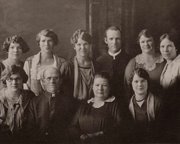Kurdistan Freedom Falcons threaten to end peace initiatives
Writing a global terrorism analysis in Terrorism Monitor Volume 8 Issue 7, published February 19, 2010 at The Jamestown Foundation website, Emrullah Uslu warns that an offshoot of the PKK -- a rebel Kurdish organization in Turkey led by the imprisoned Abdullah Ocalan -- has threatened to resume a campaign of terror targeting Turkish metropolises and major Turkish political parties.
The group, calling themselves the Kurdistan Freedom Falcons (TAK), accuses the PKK of being passive in its fight with the Turkish state, but is "leaving the door open to cooperate with the PKK if it agrees to intensify its struggle," according to the report.
The threat to resume violence is in reaction to the outcome of the two-year long Constitutional Court case against the Kurdish nationalist political party, the DTP, by which its party members were removed from parliament and the party shut down because of its ties with the PKK, and the collapse of the "Kurdish Initiative" following negative Turkish public reaction to reconciliation efforts, such as the amnesty given to 36 Kurdish dissidents.
Meanwhile, the PKK's acting leader, Murat Karayilan, has issued a statement towards ending the violence that includes a mutual ceasefire, the release of local Kurdish politicians arrested in a raid against the People's Confederation of Kurdistan (KCK), a Kurdish urban youth mobilization organization accused of street violence, a release of Abdullah Ocalan, and the initiation of direct negotiations between Kurdish political leaders and the Ankara government. The statement also demands recognition of the PKK as a legitimate representative of the Kurdish people in Turkey.
The significance of these events relative to Jeremiah's prophecy of doom on Babylon is that three factions of "Medes" are predicted to rise up and join in battle against the army of the Chaldeans -- the "kingdoms of Ararat, Minni, and Ashkenaz... the kings of the Medes" (Jer 51:27-28). These three designations align with the three factions of modern-day Kurds: the Turkish, Iranian and Iraqi Kurds. While the Iranian and Iraqi Kurds have joined together to form a semi-autonomous government in Iraq, the Kurdistan Regional Government, the Turkish Kurds remain separate from them, locked in a struggle with the Turkish government over long-standing grievances.
Once the burning of the Iraqi cities has occurred, followed by the abandonment of Iraq by the occupying forces led by the U.S., the 4th and 5th judgments of doom on Babylon, the way is prepared for the 6th judgment to begin -- the war between the kings of the Medes and the "mighty men of Babylon" (Jer 51:27-30).
But first, the Median kingdom of "Ararat" -- the Urartu or Turkish Kurds -- must join in some fashion with their Mannaean and Adiabene brethren. What form that cooperation or outright union takes will be very interesting to observe.
Writing a global terrorism analysis in Terrorism Monitor Volume 8 Issue 7, published February 19, 2010 at The Jamestown Foundation website, Emrullah Uslu warns that an offshoot of the PKK -- a rebel Kurdish organization in Turkey led by the imprisoned Abdullah Ocalan -- has threatened to resume a campaign of terror targeting Turkish metropolises and major Turkish political parties.
The group, calling themselves the Kurdistan Freedom Falcons (TAK), accuses the PKK of being passive in its fight with the Turkish state, but is "leaving the door open to cooperate with the PKK if it agrees to intensify its struggle," according to the report.
The threat to resume violence is in reaction to the outcome of the two-year long Constitutional Court case against the Kurdish nationalist political party, the DTP, by which its party members were removed from parliament and the party shut down because of its ties with the PKK, and the collapse of the "Kurdish Initiative" following negative Turkish public reaction to reconciliation efforts, such as the amnesty given to 36 Kurdish dissidents.
Meanwhile, the PKK's acting leader, Murat Karayilan, has issued a statement towards ending the violence that includes a mutual ceasefire, the release of local Kurdish politicians arrested in a raid against the People's Confederation of Kurdistan (KCK), a Kurdish urban youth mobilization organization accused of street violence, a release of Abdullah Ocalan, and the initiation of direct negotiations between Kurdish political leaders and the Ankara government. The statement also demands recognition of the PKK as a legitimate representative of the Kurdish people in Turkey.
The significance of these events relative to Jeremiah's prophecy of doom on Babylon is that three factions of "Medes" are predicted to rise up and join in battle against the army of the Chaldeans -- the "kingdoms of Ararat, Minni, and Ashkenaz... the kings of the Medes" (Jer 51:27-28). These three designations align with the three factions of modern-day Kurds: the Turkish, Iranian and Iraqi Kurds. While the Iranian and Iraqi Kurds have joined together to form a semi-autonomous government in Iraq, the Kurdistan Regional Government, the Turkish Kurds remain separate from them, locked in a struggle with the Turkish government over long-standing grievances.
Once the burning of the Iraqi cities has occurred, followed by the abandonment of Iraq by the occupying forces led by the U.S., the 4th and 5th judgments of doom on Babylon, the way is prepared for the 6th judgment to begin -- the war between the kings of the Medes and the "mighty men of Babylon" (Jer 51:27-30).
But first, the Median kingdom of "Ararat" -- the Urartu or Turkish Kurds -- must join in some fashion with their Mannaean and Adiabene brethren. What form that cooperation or outright union takes will be very interesting to observe.
Labels: Judgment 6 - Civil War



0 Comments:
Post a Comment
Subscribe to Post Comments [Atom]
<< Home